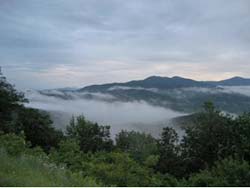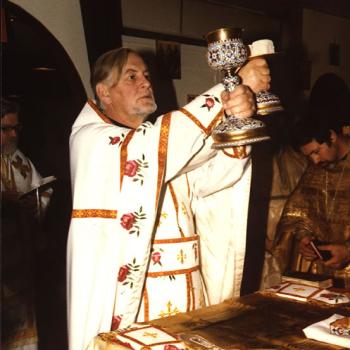From the Bones of Our Ancestors:
Rites of Passage for Christians
By Kedar S. Brown
 I received a letter containing an account of a recent suicide: "My friend . . . jumped off the Golden Gate Bridge two months ago. She had been terribly depressed for years. There was no help for her. None that she could find that was sufficient. She was trying to get from one phase of her life to another, and couldn't make it. She had been terribly wounded as a child . . . Her wound could not be healed. She destroyed herself." The letter had already asked, "How does one pass through youth to maturity without breaking down?" And it had answered, "With help from tradition, through ceremonies and rituals, rites of passage at the most difficult stages." ~ Wendell Berry, The Unsettling of America
I received a letter containing an account of a recent suicide: "My friend . . . jumped off the Golden Gate Bridge two months ago. She had been terribly depressed for years. There was no help for her. None that she could find that was sufficient. She was trying to get from one phase of her life to another, and couldn't make it. She had been terribly wounded as a child . . . Her wound could not be healed. She destroyed herself." The letter had already asked, "How does one pass through youth to maturity without breaking down?" And it had answered, "With help from tradition, through ceremonies and rituals, rites of passage at the most difficult stages." ~ Wendell Berry, The Unsettling of America
Almost every culture throughout history has traditions involving the initiations or rites of passage in the wilderness by which individuals confirm the attainment of new life stations, i.e.: manhood, womanhood, or elder years and other important life decisions. The wonder year, the pilgrimage, the vision quest and the underworld journey are typical of such initiatory experiences. Rites of passage are deeply embedded in mythological consciousness as well -- the fasting prophets of Judeo-Christianity, the questing ancestors of the Aboriginal Dreamtime, the pilgrimages of the Buddha and Mohammed, the medieval knights and their quest for the holy grail, the underworld journey of the great matriarchal deities, and Native Americans such as Crazy Horse, Black Elk and countless others." ~ Foster and Little, Book of the Vision Quest
It was a life changing opportunity to remember what in my life is sacred and the insights about what to do with that experience. I plan to offer the experience to my children as they come of age. I love it! ~ Carpenter, age 40
Over the ages we have experienced a decline in many of the meaningful rites of passage and initiation practices for our society. The once sacred and transformative ceremonies and rituals that informed early cultures with personal vision, community responsibility, and deeply rooted connection to earth and Spirit have often been replaced by "pseudo initiations." These do not facilitate or support the needed shift in consciousness required to enter into new life stations and responsibilities such as conception, graduation, baptism, confirmation, marriage, divorce, change in career, times of psychological or spiritual crisis, adulthood, and other developmental life passages.
The vision quest was the single most wonderful, most terrifying, most eye opening experience I've ever had in my life. I really started learning who I am and what my path looks like. ~ Librarian, age 33
With the absence of such initiatory practices, many will unconsciously abandon their own personal wisdom and truth, adopting the values and stories of a larger culture that often follows a spiritually devoid mythology of consumerism and economic advancement at the expense of its children and elders of all species.
My experience was deeply meaningful. It was other worldly breath that breathed new life into me. It made so many whispers in my own soul come clear. It was a cleansing baptism in the waters of my own consciousness and in the waters alive with Spirit. ~ Singer/Song Writer, age 54
Archeological evidence suggests that the vision quest is an ancient pan-cultural rite of passage that has been practiced in various forms and traditions around the world for over 50,000 years. To "walk naked" into the wilderness and pray for vision has been the way of many ancestors as they sought to uncover the mysteries of their own sacred medicine and return to their people with vision and purpose.
Listening to God's silence I came away with new clarity and deeper connectedness to God and man. With wounded healers true love abides. ~ Artist, age 60
Throughout history and across cultures there are consistently three distinct phases to every wilderness rite of passage or vision quest ceremony.
- Severance: Separation from the old life, a letting go.
- Threshold: A period of isolation in the wilderness.
- Return: Coming back with renewed vision and purpose to be of service.
During the threshold phase of a wilderness rite of passage or vision quest ceremony there are common elements that are also consistent: a) fasting, cleansing the mind and body; b) solitude, to be without other human contact; c) exposure to the natural forces of nature; and d) prayer, seeking and receiving the guidance of the Holy Spirit.




